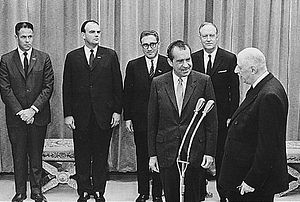In the early 1960s, France announced its dissatisfaction with the international system. Having been chased from Indochina and Algeria, and having seen its invasion of Egypt squashed by Dwight Eisenhower, France was in no mood for accommodation. President Charles de Gaulle captured the moment perfectly, charting an aggressive course to restore France’s prestige (and authority over both economic and security issues) within Europe.
The Empty Chair Crisis, in which France effectively stopped all work in the European Economic Community in an effort to get the voting rules it wanted, is an emblematic example of vigorous political competition within an existing rule-set. Similarly, the very public French withdrawal from NATO military command (complemented by a very private set of arrangements that guaranteed French support of NATO in the case of actual conflict) was representative of de Gaulle’s push to the absolute limits of legitimate competition in the creation and management of the rules for Cold War European politics.
The comparison gets to the core of what it means to be a revisionist or a status quo state. France was deeply dissatisfied with its position. Yet, while it strained against many of the norms and institutions of the system, it avoided challenging the most important formal and informal rules for managing international politics in the Cold War era.
Was de Gaulle a revisionist? In a local sense, surely; he wanted to enhance France’s voice and had broader ambitions about restoring Europe’s global influence. China and the Soviet Union, on the other hand, took steps of various magnitude to completely upend the international system. Beijing, less comfortable than the Moscow, pursued even more radical efforts than the USSR.
To take another example, it’s clearly plausible to argue that Shinzo Abe wants to revise the domestic rule-set that guides Japanese security policy, and that he wants to revise the role that Japan plays in securing its own space within the global rule-set. It’s much more of a stretch to suggest that Abe wants to revise that global rule-set. The contrast between Abe and the pre-World War II Japanese approach to East Asian politics is stark.
And so how should we think about this in context of the development of the AIIB? In the starkest terms, the AIIB doesn’t rise to the level of the Empty Chair Crisis, and even the construction of the Great Wall of Sand suggests a restrained approach to international competition, an approach that pushes the existing rule-set, and that carefully bends or breaks part of that rule-set, but that in the end is recognizably restrained by the existing norms of international behavior.
Competition within a given system is still competition, and the United States should worry about increases in Chinese military capabilities. Similarly, states invested in the South and East China Sea disputes should view the growth of Chinese power and assertiveness with wariness. But we should also take care not to overstate the degree to which China is challenging the global international order. We have plenty of examples from the 20th century of what revisionist states really look like.
































